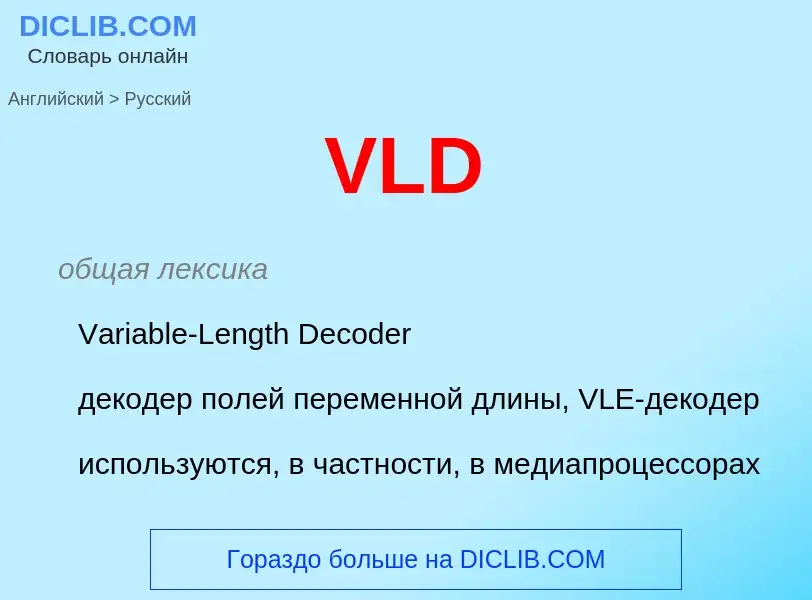Μετάφραση και ανάλυση λέξεων από την τεχνητή νοημοσύνη ChatGPT
Σε αυτήν τη σελίδα μπορείτε να λάβετε μια λεπτομερή ανάλυση μιας λέξης ή μιας φράσης, η οποία δημιουργήθηκε χρησιμοποιώντας το ChatGPT, την καλύτερη τεχνολογία τεχνητής νοημοσύνης μέχρι σήμερα:
- πώς χρησιμοποιείται η λέξη
- συχνότητα χρήσης
- χρησιμοποιείται πιο συχνά στον προφορικό ή γραπτό λόγο
- επιλογές μετάφρασης λέξεων
- παραδείγματα χρήσης (πολλές φράσεις με μετάφραση)
- ετυμολογία
VLD - translation to ρωσικά
общая лексика
Variable-Length Decoder
декодер полей переменной длины, VLE-декодер
используются, в частности, в медиапроцессорах
Смотрите также
Βικιπαίδεια
The Open Flemish Liberals and Democrats (Dutch: Open Vlaamse Liberalen en Democraten, pronounced [ˈoːpə(ɱ) ˈvlaːmsə libəˈraːlə(n) ɛn deːmoːˈkraːtə(n)] (listen) French: Libéraux et démocrates flamands ouverts; Open Vld) is a Flemish conservative liberal political party in Belgium. A smaller fraction within the party has social liberal views.
The party was created in 1992 from the former bilingual Party for Freedom and Progress (PVV) and politicians from other parties after Belgium was reconstituted as a federal state based on language, with the French-speaking faction forming the Reformist Movement (MR) in Wallonia. The party led the government for three cabinets under Guy Verhofstadt from 1999 until March 2008. Open VLD then formed the Federal Government with N-VA, CD&V and Mouvement Réformateur.
In the Flemish Parliament, the VLD formed a coalition government with sp.a-Spirit and Christian Democratic and Flemish (CD&V) from after the 2004 regional election until the 2009 regional election. Open VLD has been a member of the Leterme I Government formed on 22 March 2008, the Van Rompuy I Government formed on 2 January 2009, the Leterme II Government formed on 24 November 2009 and the Di Rupo Government formed on 6 December 2011.
Ideologically, Open VLD started as an economically liberal and somewhat libertarian Thatcherite party under its founder, Guy Verhofstadt which mirrored some of the original ideology of the PVV. The VLD rapidly became more centrist and gave up much of its free market approach, partly under the influence of Verhofstadt's political scientist brother Dirk Verhofstadt, although the VLD continued to contain conservative-libertarian and classical liberal wings with ties to think-tanks like Nova Civitas. Party chairman Bart Somers called in November 2006 for a "revolution" within the party, saying that "a liberal party", like the VLD, "can be only progressive and social".
From 2000 to 2004, during the second period of its participation in the Belgian federal government and under Belgian Prime Minister Guy Verhofstadt, the VLD allegedly lost most of its ideological appeal. Several of its thinkers such as (former member) Boudewijn Bouckaert, president of Nova Civitas, heavily criticised the party. Many others, particularly from the party's conservative and Flemish autonomist wing, resented the priority it placed on the 'Belgian compromise', which enabled the French Community's Socialist Party to gain a dominant position in the formulation of Belgian federal government policy.
In 2004, the VLD teamed up with the minority social-liberal party Vivant for both the Flemish and European elections. VLD-Vivant lost the elections to arch rivals CD&V and the Flemish Bloc. The VLD fell from second to third place among the Flemish political parties, slipping narrowly behind the sp.a-Spirit cartel. Internal feuds, the support for electoral rights for immigrants and an unsuccessful economic policy were seen as the main reasons for its election defeat. From 2007 the party kept having electoral difficulties, first due to competition from split-off List Dedecker and after 2010 from the liberal-conservative Flemish-nationalist party N-VA.







